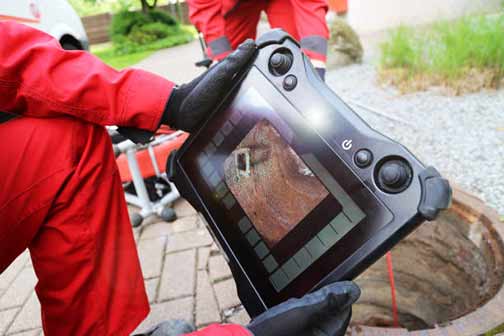
Sewer gas is a mixture of various gases produced by the decomposition of organic household or industrial waste. It typically consists of hydrogen sulfide, ammonia, methane, and other gases. The odor of sewer gas is often described as similar to the smell of rotten eggs due to the presence of hydrogen sulfide. This distinct smell is a key indicator of sewer gas in your home and should not be ignored.
Common Causes of Sewer Gas in Your Home
There are several reasons why sewer gas might be present in your home. Understanding these causes can help you address the issue effectively:
Dry Plumbing Traps
Plumbing traps are designed to hold water, which acts as a barrier to prevent sewer gases from entering your home. If these traps dry out, sewer gases can escape into your living space. This is often the case in seldom-used sinks, showers, or floor drains.
Broken or Cracked Sewer Pipes
Damaged sewer pipes can allow sewer gas to seep into your home. This can occur due to age, wear and tear, or external factors such as tree roots infiltrating the pipes. Regular camera inspections of your sewer system line can help prevent this issue.
Blocked Vent Pipes
Vent pipes are designed to release sewer gases outside your home. If these pipes become blocked, the gases can be forced back into your living space. Common causes of blocked vent pipes include debris, bird nests, or snow and ice accumulation.
Loose or Broken Seals
Seals around plumbing fixtures, such as toilets and sinks, can become loose or broken over time. This can allow sewer gas to escape into your home. Regularly checking and maintaining these seals can help prevent this problem.

Exposure to sewer gas can cause headaches and dizziness.
Health Risks Associated with Sewer Gas Exposure
Exposure to sewer gas can pose several health risks, particularly if the exposure is prolonged or the concentration of gases is high. Some of the potential health risks include:
Respiratory Issues
Inhaling sewer gas can irritate the respiratory system, leading to symptoms such as coughing, shortness of breath, and throat irritation. Individuals with pre-existing respiratory conditions, such as asthma, may be more susceptible to these effects.
Headaches and Dizziness
Exposure to sewer gas can cause headaches and dizziness. This is particularly true for hydrogen sulfide, which can affect the central nervous system. In severe cases, high concentrations of hydrogen sulfide can lead to loss of consciousness.
Eye and Skin Irritation
Sewer gas can cause irritation to the eyes and skin. This can result in symptoms such as redness, itching, and discomfort. Individuals with sensitive skin or allergies may be more prone to these effects.
Nausea and Fatigue
Prolonged exposure to sewer gas can cause nausea and fatigue. This is due to the body’s response to the toxic gases present in sewer gas. In severe cases, prolonged exposure can lead to more serious health issues.
Steps to Take If You Detect Sewer Gas in Your Home
If you suspect that sewer gas is present in your home, it is crucial to take immediate action to address the issue. Here are some steps to follow:
Identify the Source
The first step is to identify the source of the sewer gas. Check for dry plumbing traps, damaged sewer pipes, blocked vent pipes, and loose or broken seals. This will help you determine the appropriate course of action.
Ventilate Your Home
Open windows and doors to ventilate your home and allow fresh air to circulate. This can help to disperse the sewer gas and reduce its concentration in your living space.
Seal Plumbing Fixtures
Ensure that all plumbing fixtures are properly sealed. Check for any loose or broken seals around toilets, sinks, and other fixtures. Replace or repair any damaged seals to prevent sewer gas from escaping.
Clean and Maintain Plumbing Traps
Regularly clean and maintain plumbing traps to ensure they are functioning properly. Pour water into seldom-used sinks, showers, and floor drains to keep the traps filled and prevent them from drying out.
Inspect and Repair Sewer Lines
Have a professional inspect your sewer line for any signs of damage or wear. Repair or replace any damaged sewer lines to prevent sewer gas from seeping into your home.
Clear Blocked Vent Pipes
Check vent pipes for any blockages and clear them if necessary. This may involve removing debris, bird nests, or snow and ice accumulation. Ensuring that vent pipes are clear can help to release sewer gases outside your home.

Have a professional inspect your sewer pipes for any signs of damage or wear.
Preventative Measures to Keep Sewer Gas Out of Your Home
Taking preventative measures can help to keep sewer gas out of your home and ensure a safe and healthy living environment. Here are some tips to consider:
Regular Maintenance
Schedule regular maintenance for your plumbing and sewer systems. This can help to identify and address any potential issues before they become serious problems.
Use Drain Covers
Use drain covers in sinks, showers, and floor drains to prevent debris from entering and causing blockages. This can help to keep plumbing traps functioning properly and prevent sewer gas from escaping.
Install Backflow Prevention Devices
Consider installing backflow prevention devices in your plumbing system. These devices can help to prevent sewer gas from entering your home in the event of a backup or blockage.
Monitor for Signs of Sewer Gas
Be vigilant for any signs of sewer gas in your home, such as the smell of rotten eggs, and take immediate action if you detect it. Early detection and intervention can help to prevent more serious issues.
Educate Your Household
Educate all members of your household about the signs and risks of sewer gas. Encourage them to report any unusual smells or symptoms immediately so that you can address the issue promptly.
When to Call a Professional
While there are several steps you can take to address sewer gas in your home, there are times when it is best to call a professional. Here are some situations where professional assistance may be necessary:
Persistent Odor
If the smell of sewer gas persists despite your efforts to address the issue, it may be time to call a professional. A persistent odor can indicate a more serious problem that requires expert intervention.
Visible Damage to Sewer Pipes
If you notice any visible damage to your sewer pipes, such as cracks or leaks, it is important to call a professional immediately. Damaged pipes can pose significant health risks and should be repaired or replaced promptly.
Health Symptoms
If you or any members of your household experience health symptoms such as headaches, dizziness, respiratory issues, or skin irritation, it is crucial to seek professional help. These symptoms can indicate exposure to sewer gas and should not be ignored.
Complex Plumbing Issues
Some plumbing issues can be complex and require specialized knowledge and equipment to address. If you are unsure how to handle a plumbing problem, it is best to call a professional to ensure the issue is resolved correctly.
Conclusion
Sewer gas in your home can pose serious health risks and should be addressed promptly. By understanding the causes of sewer gas, taking immediate action to address any issues, and implementing preventative measures, you can ensure a safe and healthy living environment for you and your family. If in doubt, do not hesitate to seek professional assistance to resolve any persistent or complex issues related to sewer gas in your home.